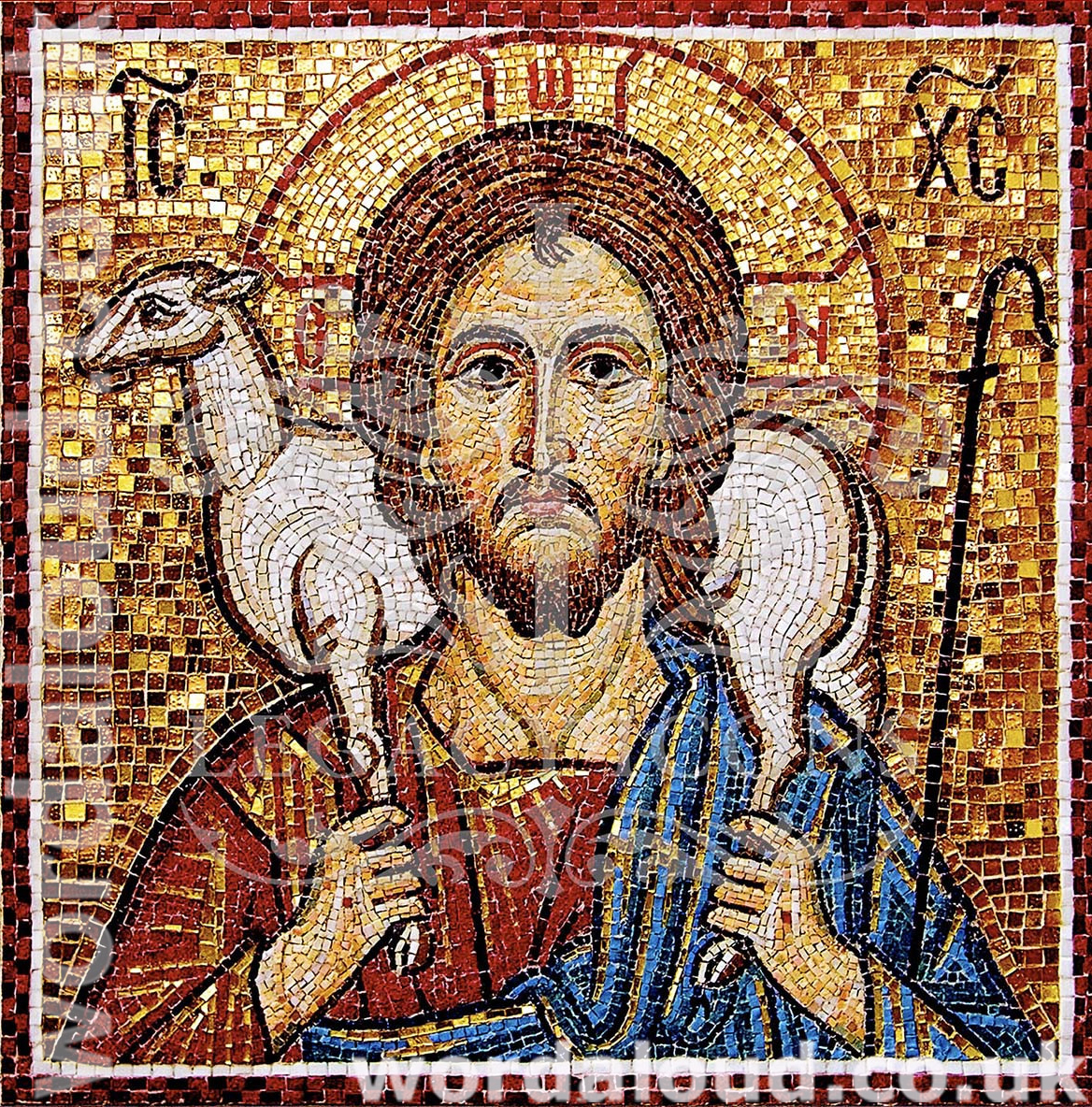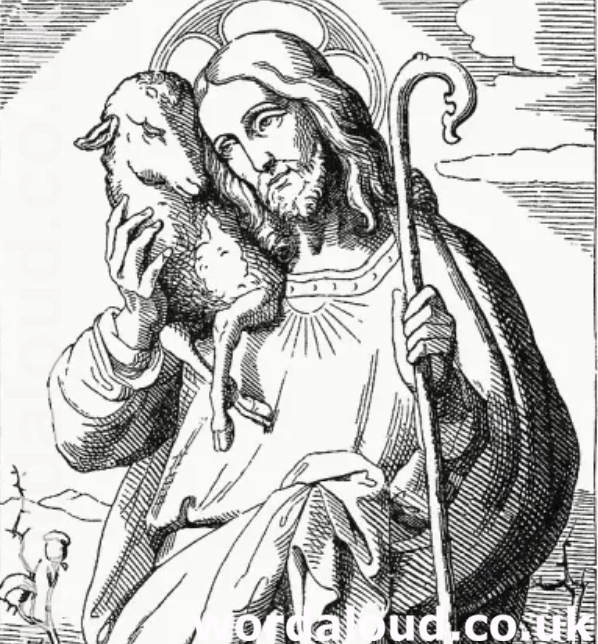Christian Art | Christian Community | Boy At Prayer With Jesus In Community
Office Of Readings | Eastertide Week 5, Wednesday | A Reading From The Letter Of Diognetus | Christian Living | In The World, But Not Of The World | What It Means To Be Christian
‘Christians are in the world, but not of the world.’
Christians | In The World, But Not Of The World
The author begins by asserting that Christians are not marked by external distinctions such as nationality, language, or customs. This is a key theological point: Christian identity is not rooted in ethnicity or civil status but in a transformed relationship with God through Christ. This echoes Paul’s words in Galatians 3:28, ‘There is neither Jew nor Greek… for you are all one in Christ Jesus.’
Christians blend into society—they marry, raise children, dress, eat, and work like others—but they live with a radical spiritual orientation. Their true ‘citizenship is in heaven’ (Philippians 3:20), and they view life on earth as a pilgrimage. This tension between presence and detachment highlights the paradoxical nature of Christian witness: they fully engage with their society while simultaneously transcending its values.
Moral Distinction | A Transfigured Way Of Life
What distinguishes Christians, the author notes, is not cultural separatism but moral and spiritual discipline. The reference to ‘not exposing their children’ alludes to the Greco-Roman practice of infanticide and child abandonment, which Christians rejected on the grounds of the sanctity of human life. Similarly, sharing meals but not wives counters the common Roman perception that Christians were morally lax or secretive; instead, the author defends a vision of chastity and community that was both countercultural and deeply ethical.
Christians ‘live in the flesh, but are not governed by it’. This phrase is both theological and anthropological. It affirms the incarnation (Christ entered into flesh) while also promoting asceticism—not in the sense of rejecting the body, but of not allowing bodily appetites to dominate one’s soul. This aligns with the New Testament ethic, especially in Paul’s letters (e.g., Romans 8:5–9).
Persecution And Paradox
One of the most poignant aspects of the text is the description of Christians being universally misunderstood and persecuted, yet joyfully enduring suffering. This reflects the early Church’s lived reality under Roman suspicion and sporadic persecution. The paradoxes (‘they are put to death, but raised to life again… they suffer dishonour, but that is their glory’) embody the mystery of the Cross and Resurrection. The Christian, like Christ, triumphs through humility and apparent defeat.
This section echoes Jesus’ Beatitudes: ‘Blessed are you when people insult you, persecute you and falsely say all kinds of evil against you because of me.’ (Matthew 5:11) The author insists that the Christian response is always one of blessing, forgiveness, and joy—even in adversity. This spiritual resilience becomes a powerful testimony to the truth of their faith.
The Soul Of The World | A Theological Metaphor
The most famous and perhaps most profound analogy in the letter is the comparison of Christians to the soul in the body. This image blends classical philosophical concepts (especially Platonic and Stoic) with Christian theology. In Greco-Roman thought, the soul was often considered the animating, rational principle of the body. Likewise, the Christian presence gives life and cohesion to the world—not through domination or political power, but through spiritual integrity and divine grace.
Yet, just as the body resists the soul’s discipline, so too does the world resist the Christian moral challenge. Christians are not persecuted for wrongdoing but because their way of life unsettles the world’s attachment to pleasure, vice, and self-interest. This reflects Jesus’ own warning in John 15:19: ‘If you belonged to the world, it would love you as its own… but I have chosen you out of the world.’
Eschatological Hope
The author concludes with a hopeful eschatological vision: Christians, though they dwell amid perishable things, await a future of freedom, immortality, and divine glory. Their endurance is not in vain. Like seeds sown in suffering, they will rise in glory. This perspective not only offers hope to persecuted believers but also reveals how deeply the resurrection of Christ reshapes Christian anthropology and destiny.

A Reading From The Letter Of Diognetus | Christian Living | In The World, But Not Of The World | What It Means To Be Christian
Christians are indistinguishable from other men either by nationality, language or customs. They do not inhabit separate cities of their own, or speak a strange dialect, or follow some outlandish way of life. Their teaching is not based upon reveries inspired by the curiosity of men. Unlike some other people, they champion no purely human doctrine. With regard to dress, food and manner of life in general, they follow the customs of whatever city they happen to be living in, whether it is Greek or foreign.
And yet there is something extraordinary about their lives. They live in their own countries as though they were only passing through. They play their full role as citizens, but labour under all the disabilities of aliens. Any country can be their homeland, but for them their homeland, wherever it may be, is a foreign country. Like others, they marry and have children, but they do not expose them. They share their meals, but not their wives. They live in the flesh, but they are not governed by the desires of the flesh. They pass their days upon earth, but they are citizens of heaven. Obedient to the laws, they yet live on a level that transcends the law.
Christians love all men, but all men persecute them. Condemned because they are not understood, they are put to death, but raised to life again. They live in poverty, but enrich many; they are totally destitute, but possess an abundance of everything. They suffer dishonour, but that is their glory. They are defamed, but vindicated. A blessing is their answer to abuse, deference their response to insult. For the good they do they receive the punishment of malefactors, but even then they rejoice, as though receiving the gift of life. They are attacked by the Jews as aliens, they are persecuted by the Greeks, yet no one can explain the reason for this hatred.
To speak in general terms, we may say that the Christian is to the world what the soul is to the body. As the soul is present in every part of the body, while remaining distinct from it, so Christians are found in all the cities of the world, but cannot be identified with the world. As the visible body contains the invisible soul, so Christians are seen living in the world, but their religious life remains unseen. The body hates the soul and wars against it, not because of any injury the soul has done it, but because of the restriction the soul places on its pleasures. Similarly, the world hates the Christians, not because they have done it any wrong, but because they are opposed to its enjoyments.
Christians love those who hate them just as the soul loves the body and all its members despite the body’s hatred. It is by the soul, enclosed within the body, that the body is held together, and similarly, it is by the Christians, detained in the world as in a prison, that the world is held together. The soul, though immortal, has a mortal dwelling place; and Christians also live for a time amidst perishable things, while awaiting the freedom from change and decay that will be theirs in heaven. As the soul benefits from the deprivation of food and drink, so Christians flourish under persecution. Such is the Christian’s lofty and divinely appointed function, from which he is not permitted to excuse himself.
Glossary Of Terms
Diognetus
Likely a pagan inquirer or official to whom this early Christian apologetic letter is addressed. His exact identity is unknown, but the name was common in antiquity.
Apologetic / Apology
A reasoned defense of the Christian faith. The Letter to Diognetus is considered an example of early Christian apologetics, explaining and justifying the Christian way of life to a non-Christian audience.
Customs
Refers to the cultural norms and behaviors (e.g., dress, diet, laws) of various cities or peoples. The letter stresses that Christians outwardly conform to these while inwardly maintaining a distinct spiritual identity.
Exposing Children
An ancient practice in Greco-Roman societies where unwanted infants were left to die outdoors. Christians opposed this on ethical and theological grounds, valuing all human life as sacred.
Flesh
In this context, it symbolizes human nature, especially physical and moral vulnerability. While Christians live ‘in the flesh’ (physically in the world), they are not ‘governed by it’—that is, not dominated by sinful desires.
Citizens of Heaven
A theological phrase rooted in Philippians 3:20, emphasizing that Christians belong ultimately to God’s kingdom, not merely to earthly nations or systems.
Transcend the Law
Refers to Christians not only obeying civil laws but living according to a higher spiritual law of love, holiness, and divine truth.
Persecution
Refers to the hostility and suffering faced by early Christians, including misunderstanding, legal penalties, social ostracization, and sometimes martyrdom.
Malefactors
A term meaning criminals or wrongdoers. Christians were often treated as such by authorities, despite their ethical lives.
Vindicated
Declared righteous or justified. The letter insists that though Christians are defamed, they are ultimately vindicated—both by God and through their enduring witness.
The Soul
Used metaphorically to describe the role of Christians in the world. Just as the soul gives life and structure to the body, Christians sustain and bless the world through their spiritual presence.
Mortal / Immortal
Mortal refers to the temporary, earthly existence; immortal to the eternal, divine nature of the soul—and by extension, the Christian hope of eternal life.
Change and Decay
Biblical imagery (cf. Romans 8:21–22) describing the transient nature of the physical world. Christians await liberation from this impermanence in the eternal life promised by God.
Divinely Appointed Function
Refers to the God-given role of Christians in the world: to live as witnesses to truth, love, and grace—regardless of suffering or rejection.
Early Church
The community of believers in the first few centuries after Christ’s resurrection. The lifestyle described in the letter reflects how this community understood itself theologically and ethically.








